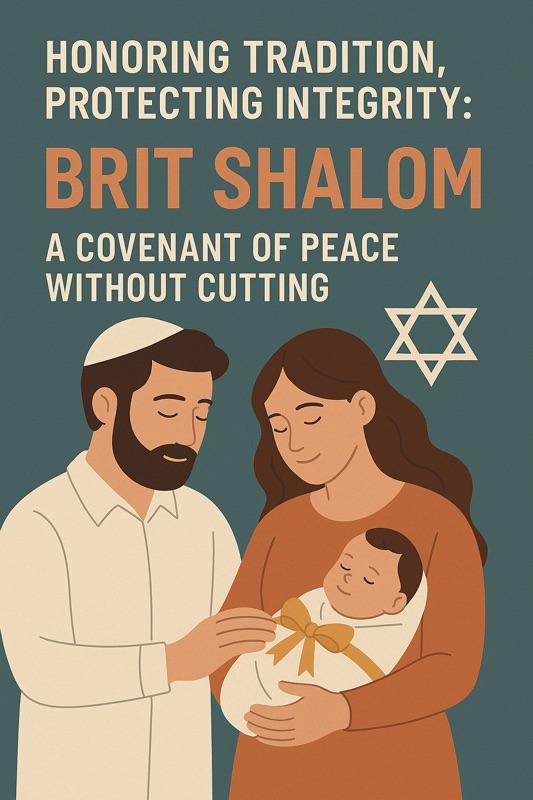Brit Shalom: The Peaceful Covenant – A Non-Cutting Alternative in Judaism
Brit Shalom: The Peaceful Covenant – A Non-Cutting Alternative in Judaism
By 𝘼𝙫𝙤𝙘𝙖𝙙𝙤𝙅𝙖𝙮23 | 𝘼𝙙𝙫𝙤𝙘𝙖𝙩𝙞𝙣𝙜𝘼𝙫𝙤𝙘𝙖𝙙𝙤
✌️💚🥑🍌 | “Genitals Shouldn’t Have Scars.”
Introduction: A Shift Toward Peace and Integrity
After watching a moving documentary, I discovered something both surprising and hopeful: in some modern Jewish communities, parents are choosing a Brit Shalom—a non-cutting naming and covenant ceremony—instead of the traditional circumcision (Brit Milah). Endorsed by certain rabbis and celebrated with sacred symbolism, this marks a powerful evolution toward body-honoring spiritual practices.
What is Brit Shalom?
Brit Shalom (also spelled Bris Shalom) means “Covenant of Peace” in Hebrew.
It is a non-surgical Jewish naming ceremony for infant boys.
• Purpose: To welcome the baby into the Jewish faith and community
• Difference from Brit Milah: No cutting, no circumcision, no pain
• Approved by: Some rabbis, particularly from Reform, Reconstructionist, and Humanistic Jewish movements
Symbolic Rituals Included
• Ribbon Tying Ceremony: Often a ribbon is gently tied around the baby as a symbol of the covenant
• Blessings & Prayers: Traditional Hebrew prayers are adapted to reflect peace and wholeness
• Naming Ritual: The child is given a Hebrew name, surrounded by family and love
• Personalized Elements: Some families include candles, poetry, or readings from the Torah emphasizing compassion
Why Families Are Choosing Brit Shalom
• Preserving Jewish Identity while rejecting violence or trauma
• Protecting bodily autonomy and integrity
• Responding to modern ethics, medical research, and consent culture
• Acknowledging circumcision regret among men and honoring future choice
• Avoiding genital cutting while keeping spiritual tradition alive
A Rabbinical Shift: Judaism Without Cutting?
Many rabbis are now re-evaluating the necessity of Brit Milah in modern times.
• Some assert that the spirit of the covenant can be honored without mutilation
• The Torah’s original commandment has historical context and does not explicitly require modern surgical methods
• Some Jewish scholars argue that God values compassion and wholeness over blood
• Brit Shalom allows for cultural evolution within tradition
Courageous Parents, Empowered Children
Parents who choose Brit Shalom are often:
• Advocating for their sons’ right to bodily autonomy
• Breaking generational cycles of trauma
• Creating new Jewish legacies rooted in peace
• Embracing a growing global community of intact Jewish men
Watch the Documentary
Here’s the eye-opening video that inspired this article:
📖🎥 Cut, uncut - Male circumcision | DW Documentary
Jewish Families Choosing Brit Shalom
🔗 https://youtu.be/WQYGcBcEcEU?si=cY-x_LhdiN822EVg
Closing Thoughts: The Rise of the Covenant of Peace
Brit Shalom is more than a ceremony—it’s a spiritual revolution.
It proves that ancient faith can evolve with compassion, honoring both tradition and the sanctity of the body.
In a world waking up to the importance of genital integrity, this peaceful covenant offers hope, healing, and a model for what true consent-based faith practices can look like.
Jewish Voices Advocating for Alternatives to Circumcision
In recent years, a growing number of Jewish individuals and communities have begun to question the necessity of traditional circumcision, seeking rituals that honor both their faith and the bodily integrity of their children. This movement reflects a broader dialogue within Judaism about maintaining religious traditions while adapting to contemporary ethical understandings.
Rabbi Jeffrey Falick, leader of the Congregation for Humanistic Judaism of Metro Detroit, has been vocal about his support for Brit Shalom. He emphasizes that Jewish identity is multifaceted and not solely dependent on physical rituals. In an interview, Rabbi Falick stated:
“Judaism is a rich tapestry of culture, ethics, and community. Embracing ceremonies like Brit Shalom allows us to honor our heritage without compromising our commitment to individual autonomy and modern ethical standards.”
Similarly, Lisa Braver Moss, co-founder of the Jewish Circumcision Resource Center, has written extensively on the topic, advocating for open discussions within the Jewish community about the implications of circumcision. In her writings, she notes:
“Choosing not to circumcise is not a rejection of Judaism but an affirmation of its evolving nature. Brit Shalom offers a meaningful way to welcome our sons into the covenant, emphasizing peace and wholeness.”
These perspectives highlight a compassionate approach to tradition, demonstrating that it is possible to honor Jewish heritage while also respecting personal and ethical beliefs about bodily autonomy.
“Honoring Tradition, Protecting Integrity: Brit Shalom – A Covenant of Peace without Cutting.”
#BritShalom #CovenantOfPeace #JewishTradition #BodyAutonomy #EndCircumcision #AlternativeToCircumcision #IntactAndProud #JewishIdentity #PeacefulRituals #FaithWithoutHarm #NonCuttingCeremony

———————————————————-
📢 Want to Know the Truth?
👉 Watch Now: The Truth About Circumcision
Eric Clopper’s explosive, eye-opening presentation exposes the hidden truths about circumcision, its impact on men’s health, and the medical industry’s role in promoting it. If you care about bodily autonomy and human rights, this is a must-watch.
🔗 Sex & Circumcision: An American Love Story – Eric Clopper
🔗 https://youtu.be/FCuy163srRc?si=-I0uSf9MEV06bvY9
Comments
Post a Comment